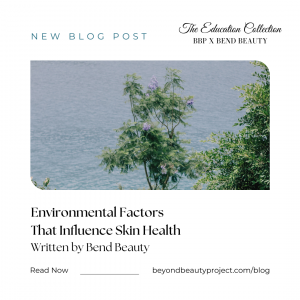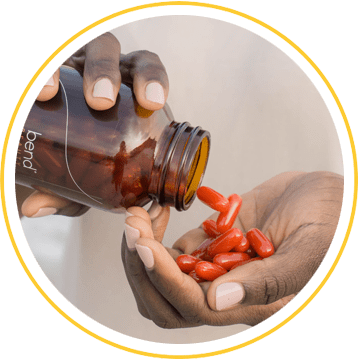
We are excited to present The Education Collection – a collaboration between Bend Beauty and The Beyond Beauty Project. The Beyond Beauty Project is a movement to help improve our self esteem and confidence around body image and mental health. Our brands are incredibly aligned, and we are thrilled to share this partnership with you.
Bend Beauty products are Beyond Beauty Project approved and contain many powerful active ingredients to unlock your skin’s potential, and optimize your wellness routine.
Your skin is more susceptible than your other organs to damaging environmental factors. For example, it is highly prone to drying by indoor heating and parched winter air. This weakens and dehydrates the skin barrier, making it appear dull, flaky, and wrinkled. Heat from the sun can pass through to the dermis and trigger production of enzymes that break down collagen and elastin. Chronic exposure induces inflammation, damages the dermal extracellular matrix, and promotes angiogenesis (i.e., blood vessel growth – like spider veins). These things promote skin aging (1). It can also lead to immune cell recruitment associated with non-melanoma skin cancer (2). Let’s dive in to more environmental factors that may damage skin health, and some things you can do environmentally to improve it!
Long, hot baths with harsh soap are problematic too (1). Dry skin in older people gets worse following hot baths and use of alkaline soaps (3). Anyone taking long, and hot baths can have skin pH changes and irritation due to skin barrier disruption, which can worsen some conditions (4). Air temperature changes may impact inactivation and excretion of toxic substances and excess nutrients. Low ambient temperatures constrict blood vessels which reduces skin blood flow and hampers delivery of triglycerides, cholesterol and some other excess nutrients destined for secretion within sebum. Lower skin temperature could also dampen the activity of some xenobiotic inactivation enzymes that typically prefer about 37 degrees Celcius to function optimally. This could reduce toxin elimination (2). On the other hand, heat exposure increases body temperature which triggers skin blood vessel dilation and sweating. Blood flow to the skin can increase from about 1 cup per minute at room temperature to 8 liters per minute at higher temperatures. Such increased surface blood flow could increase (2):
- Delivery of toxins to the skin surface
- Elimination of water-soluble toxic substances in sweat
- Elimination of lipid soluble substances within sebum
All these changes could reduce the body’s toxin load and improve its oxidative state (8). This may be one reason why saunas are valued purification or cleansing tools for environmentally induced illnesses. Sauna therapy benefits have been reported in people with hypertension, congestive heart failure, chronic obstructive pulmonary disease, chronic fatigue, chronic pain, and addictions (9). Sauna bathing also dramatically decreases a blood marker of systemic inflammation (10), which could partly account for its risk lowering effects on dementia and AD; both conditions where oxidative stress and inflammation are major contributors (11). Therefore, optimizing environmental factors to enhance skin health can also have longevity enhancing effects.
What are some things you can do environmentally to improve your skin health?
- Ensure you’re incorporating whole-food and plant-based options into your daily menu. The Mediterranean diet is well recognized to prevent age related diseases such as stroke, cognitive decline, and Alzheimer disease (12).
- Exercise. One of the best benefits of exercise is reduced inflammation. Studies show it can reduce inflammatory markers in older adults. In fact, a long-term exercise routine can actually re-program your metabolism to make fewer inflammatory metabolites on a routine basis through epigenetic changes. Such genetic changes coupled with less inflammation were measured in one study of older adults who exercised regularly and another study involving a 6-month walking regimen. However, intense training that exceeds an individual’s physical abilities can have the opposite effect – balance is key (13).
- Good quality sleep. Poor sleep quality and quantity, which is defined as 5 hours or less, is associated with increased skin ageing and decreased skin barrier function. On the other hand, after exposure to UV light, good sleepers have significantly better “sunburn” recovery (14).
- Dry-brushing! Dry-brushing your skin may also help remove toxins by increasing blood circulation in the skin and physically removes toxins from its surface by exfoliation (15).
As a free gift to you, click here to download Bend Beauty’s Ultimate Guide to Skin Health and Longevity. This 3-part series has been developed to deepen your understanding of the connection between all internal and external forces that impact skin health and longevity, and ultimately how to unlock your skin’s potential.
References:
- Addor FAS. Beyond photoaging: additional factors involved in the process of skin aging. Clin Cosmet Investig Dermatol. 2018 Sep 20;11:437-443. doi: 10.2147/CCID.S177448. PMID: 30288075; PMCID: PMC6159789. Accessed online on November 25, 2020 at https://www.ncbi.nlm.nih.gov/pmc/articles/PMC6159789/
- Milchak M, Smucker J, Chung CG, Seiverling EV. Erythema Ab Igne due to Heating Pad Use: A Case Report and Review of Clinical Presentation, Prevention, and Complications. Case Rep Med. 2016;2016:1862480. doi:10.1155/2016/1862480. Accessed online on November 26, 2020 at https:// www.ncbi.nlm.nih.gov/pmc/articles/PMC4735926/
- Thune P, Nilsen T, Hanstad IK, Gustavsen T, Lövig Dahl H. The water barrier function of the skin in relation to the water content of stratum corneum, pH and skin lipids. The effect of alkaline soap and syndet on dry skin in elderly, non-atopic patients. Acta Derm Venereol. 1988;68(4):277–283. Accessed online on November 26, 2020 at https://pubmed.ncbi.nlm.nih.gov/2459871/
- Kottner J, Lichterfeld A, Blume-Peytavi U. Maintaining skin integrity in the aged: a systematic review. Br J Dermatol. 2013;169(3):528–542. Accessed online on November 26, 2020 at https://pubmed.ncbi.nlm.nih.gov/23773110/
- Crinnion WJ. Sauna as a valuable clinical tool for cardiovascular, autoimmune, toxicant- induced and other chronic health problems. Altern Med Rev. 2011 Sep;16(3):215-25. PMID: 21951023. Accessed online on November 19, 2021 at http://archive.foundationalmedicinereview.com/publications/16/3/215.pdf
- Laukkanen JA, Laukkanen T. Sauna bathing and systemic inflammation. Eur J Epidemiol. 2018 Mar;33(3):351-353. doi: 10.1007/s10654-017-0335-y. Epub 2017 Dec 5. PMID: 29209938. Accessed online on November 19, 2020 at https://pubmed.ncbi.nlm.nih.gov/29209938/
- Laukkanen T, Kunutsor S, Kauhanen J, Laukkanen JA. Sauna bathing is inversely associated with dementia and AD in middle-aged Finnish men. Age Ageing. 2017 Mar 1;46(2):245-249. doi: 10.1093/ageing/afw212. PMID: 27932366. Accessed online on November 19, 2020 at https://academic.oup.com/ageing/article/46/2/245/2654230
- Zhou SS, Li D, Zhou YM, Cao JM. The skin function: a factor of antimetabolic syndrome. Diabetol Metab Syndr. 2012 Apr 26;4(1):15. doi:10.1186/1758-5996-4-15. PMID: 22537765; PMCID: PMC3567429. Accessed online on November 9, 2020 at https://www.ncbi.nlm.nih.gov/pmc/articles/PMC3567429/
- Giorgi C, Marchi S, Simoes ICM, Ren Z, Morciano G, Perrone M,et al. Mitochondria and Reactive Oxygen Species in Aging and Age-Related Diseases. Int Rev Cell Mol Biol. 2018;340:209-344. doi: 10.1016/bs.ircmb.2018.05.006. Epub 2018 Jun 22. PMID: 30072092. Accessed online onDecember 1, 2020 at https://pubmed.ncbi.nlm.nih.gov/30072092/
- Liguori I, Russo G, Curcio F, Bulli G, Aran L, Della-Morte D, Gargiulo G, Testa G, Cacciatore F, Bonaduce D, Abete P. Oxidative stress, aging, and diseases. Clin Interv Aging. 2018 Apr 26;13:757-772. doi: 10.2147/CIA.S158513.PMID: 29731617; PMCID: PMC5927356.Accessed online on November 10, 2020 at https://www.ncbi.nlm.nih.gov/pmc/articles/PMC5927356/
- Pullar JM, Carr AC, Vissers MCM. The Roles of Vitamin C in Skin Health. Nutrients. 2017 Aug 12;9(8):866. doi: 10.3390/nu9080866. PMID: 28805671; PMCID: PMC5579659. Accessed online on November 12, 2020 at https://www.ncbi.nlm.nih.gov/pmc/articles/PMC5579659/#B7-nutrients-09-00866
- Román GC, Jackson RE, Gadhia R, Román AN, Reis J. Mediterranean diet: The role of long-chain -3 fatty acids in fish; polyphenols in fruits, vegetables, cereals, coffee, tea, cacao and wine; probiotics and vitamins in prevention of stroke, age-related cognitive decline, and Alzheimer disease. Rev Neurol (Paris). 2019 Dec;175(10):724-741. doi: 10.1016/j.neurol.2019.08.005. Epub 2019 Sep 11. PMID: 31521398. Accessed online on November 2, 2020 at https:// pubmed.ncbi.nlm.nih.gov/31521398/
- Bachmann MC, Bellalta S, Basoalto R, Gómez-Valenzuela F, Jalil Y, Lépez M, Matamoros A, von Bernhardi R. The Challenge by Multiple Environmental and Biological Factors Induce Inflammation in Aging: Their Role in the Promotion of Chronic Disease. Front Immunol. 2020 Oct 14;11:570083. doi: 10.3389/fimmu.2020.570083. PMID: 33162985; PMCID: PMC7591463. Accessed online on November 26, 2020 at https://www.ncbi.nlm.nih.gov/pmc/ articles/PMC7591463/
- Oyetakin-White P., Suggs A., Koo B., Matsui M.S., Yarosh D., Cooper K.D., Baron E.D. Does poor sleep quality affect skin ageing? Clin. Exp. Dermatol. 2015;40:17–22. doi: 10.1111/ced.12455. Accessed online on November 25, 2020 at https://pubmed.ncbi.nlm.nih.gov/25266053/
- Dry Brushing 101: Everything You Need to Know. Byrdie.com. Accessed June 22, 2022.

